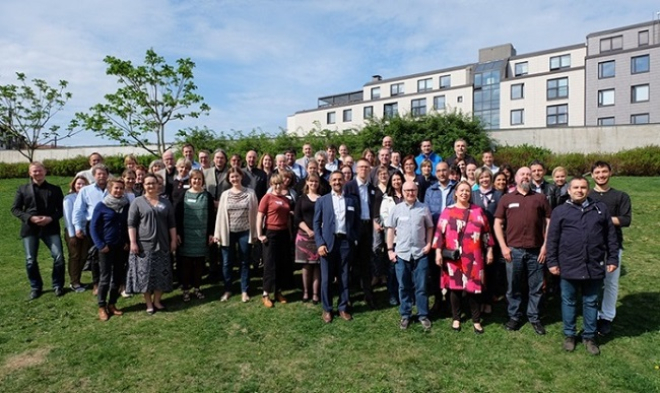Showing the added value of LEADER/CLLD through evaluation

Group picture of attendees, Helsinki Evaluation Workshop
The Evaluation Good Practice Workshop, titled “Showing the added value of LEADER/CLLD through evaluation”, took place on 17-18 May, 2018 in Helsinki, Finland and was co-organised by the ENRD Evaluation Helpdesk, the Finnish National Rural Network and the Finnish Ministry of Agriculture and Forestry.
The Scottish Rural Network (SRN) funded the attendance of two Scottish Local Action Group (LAG) co-ordinators at the event: Flick Millar of North Aberdeenshire and Kat Purser of West Lothian. SRN was represented by Alan Robertson, Network Manager.
The aim of the workshop was to provide a forum for the discussion and exchange of experiences from across the Member States to:
-
contribute to shaping a common understanding of the added value of LEADER/CLLD and its links with the LEADER/CLLD delivery mechanism and LEADER method;
-
provide a forum for the exchange of experiences between Member States and to discuss challenges related to assessing LEADER/CLLD added value;
-
develop practical recommendations on possible evaluation approaches that can show the added value of LEADER/CLLD.
The workshop was held over two days and brought together representatives of Accountable Bodies (AB), LAG’s, National Rural Networks (NRN), academia, evaluators, etc. There was a wide variety of speakers and syndicate work, including around the theory of evaluation and a practical approach to undertaking evaluation. The event, from a Scottish (and rUK) perspective, was particularly timely as strong effective evaluation of positive LEADER impacts within rural communities will be key to informing evidence to Minsters regarding future funding of rural social initiatives post Brexit.
What appeared to be a common theme, the difficulty of evaluating social capital, was quickly identified by attendees. Kat Purser (LAG Coordinator, West Lothian) said “I found it useful to take a step back and think again about what we mean by ‘added value’. When we are looking to evaluate the added value, we are asking what the impact of a LEADER intervention is beyond the quantitative results”.
This was a particular issue that resonated with LAG representatives, where the difficulty of evaluating the success of non-traditional business models was robustly discussed. Kat added “It is relatively straight forward to measure quantitative data e.g. the number of jobs created or an increase in visitor numbers to a particular site. However, impacts are often qualitative and therefore harder to measure”.
Speakers of particular relevance included Kim Pollermann of the Johann Heinrich von Thünen Institute in Germany who presented on “Assessing an improved local governance through LEADER/CLLD – Looking at the input and output of governance Arrangements” and Morten Kvistgaard, of Evaluators.EU ApS who presented on “Evaluating enhanced results of LEADER: the Danish experience”. Both these speakers impressed with their thorough, relevant and pragmatic approach to the subject matter.
The last session of the event was the highlight with the official launch of the new “Evaluation Handbook for LAGS and FLAGS” by Monica Veronesi of FARNET. The guidebook is a well thought out and comprehensive guide to evaluation, which will supplement the Monitor and Evaluation Toolkit previously made available to LAGS by SRN.
After reviewing the document, Alan Robertson (SRN network Manager) said “ this is a comprehensive document which provides a thorough overview of the evaluation process. It is particularly pleasing to see so many case studies from Scottish LAGS and FLAGS included in the guidance”.
“Kat added, “the steps that Farnet have outlined help address social capital and qualitative outputs e.g. using evaluation questions, judgement criteria and indicators which are easy to follow and produce meaningful measures of LEADER’s success”.
The outputs of the workshop were used the following week at the Scottish LAG Staff Group meeting in Lerwick, where a session on Evaluation lead by Kat and Flick was held and included syndicate work to prompt discussion and ideas around how Scottish LAG’s can use evaluation effective to demonstrate the positive effects of LEADER in their rural communities.
It was agreed by the LAG members present to set up an Evaluation Steering Group – the full remit and membership of which will be worked on over the next few weeks though part of its role would be to ensure that the evaluation toolkits and guidance are interpreted consistently, provide advice and troubleshoot where necessary.
Links to both the Farnet and SRN guidance can be found below.


